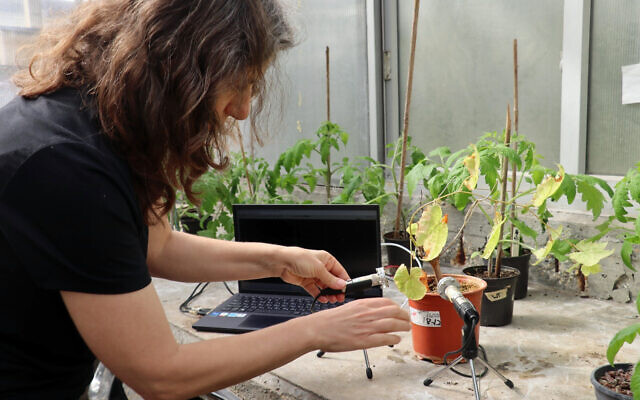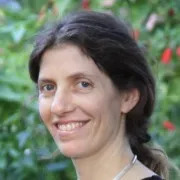Plants make popping noises when stressed, Israeli scientists reveal
"An idyllic field of flowers can be a rather noisy place," says Tel Aviv University evolutionary biologist Professor Lilach Hadany

Plants emit sounds – like bubble wrap being popped – when stressed, Israeli scientists have found.
Human ears cannot detect these noises because they are emitted at high frequencies but researchers believe insects, other mammals, and other plants might be able to hear these pops.
Professor Lilach Hadany, an evolutionary biologist and theoretician at Tel Aviv University in Israel, said: “Apparently, an idyllic field of flowers can be a rather noisy place.
“It’s just that we can’t hear the sounds.”

Professor Lilach Hadany
While high-frequency – ultrasonic – vibrations have been recorded in plants before, the scientists said this is the first evidence that these sounds travel through air, with findings published in the journal Cell.
Prof Hadany, a senior author on the study, said: “In this study, we resolved a very old scientific controversy: we proved that plants do emit sounds.
“Our findings suggest that the world around us is full of plant sounds and that these sounds contain information – for example about water scarcity or injury.
“We assume that in nature the sounds emitted by plants are detected by creatures nearby, such as bats, rodents, various insects, and possibly also other plants – that can hear the high frequencies and derive relevant information.
“We believe that humans can also utilise this information, given the right tools – such as sensors that tell growers when plants need watering.”
The researchers recorded healthy and stressed tomato and tobacco plants using microphones that have the capability to capture ultrasonic sounds between 20-250 kilohertz (humans can detect frequencies of up to 16 kilohertz).
Initial recordings took place in a soundproofed acoustic chamber, which was then followed by a noisier greenhouse environment.
To create stress, the researchers did not water some of the plants for several days and cut off the stems of others.
After recording, the scientists used machine-learning algorithms – a type of artificial intelligence – to differentiate between thirsty, cut and unstressed plants.
The algorithms could also distinguish between the sounds from tomato and tobacco plants.
The frequency range was lowered so the researchers could hear the popping sounds made by the plants.
The team found that stressed plants made more noise compared to unstressed plants, with some emitting around 30-50 of these pops per hour.
Plants deprived of water began emitting noises long before looking visibly dehydrated, with the frequency of sounds peaking after five days with no water.
The scientists said the exact mechanism behind these noises remains unclear but believe it might be due to air bubbles forming and bursting in the plant’s vascular system.
It is also unclear whether plants are producing these sounds to communicate with other organisms, the team said.
Prof Hadany added: “It’s possible that other organisms could have evolved to hear and respond to these sounds.
“For example, a moth that intends to lay eggs on a plant or an animal that intends to eat a plant could use the sounds to help guide their decision.”

Thank you for helping to make Jewish News the leading source of news and opinion for the UK Jewish community. Today we're asking for your invaluable help to continue putting our community first in everything we do.
For as little as £5 a month you can help sustain the vital work we do in celebrating and standing up for Jewish life in Britain.
Jewish News holds our community together and keeps us connected. Like a synagogue, it’s where people turn to feel part of something bigger. It also proudly shows the rest of Britain the vibrancy and rich culture of modern Jewish life.
You can make a quick and easy one-off or monthly contribution of £5, £10, £20 or any other sum you’re comfortable with.
100% of your donation will help us continue celebrating our community, in all its dynamic diversity...
Engaging
Being a community platform means so much more than producing a newspaper and website. One of our proudest roles is media partnering with our invaluable charities to amplify the outstanding work they do to help us all.
Celebrating
There’s no shortage of oys in the world but Jewish News takes every opportunity to celebrate the joys too, through projects like Night of Heroes, 40 Under 40 and other compelling countdowns that make the community kvell with pride.
Pioneering
In the first collaboration between media outlets from different faiths, Jewish News worked with British Muslim TV and Church Times to produce a list of young activists leading the way on interfaith understanding.
Campaigning
Royal Mail issued a stamp honouring Holocaust hero Sir Nicholas Winton after a Jewish News campaign attracted more than 100,000 backers. Jewish Newsalso produces special editions of the paper highlighting pressing issues including mental health and Holocaust remembrance.
Easy access
In an age when news is readily accessible, Jewish News provides high-quality content free online and offline, removing any financial barriers to connecting people.
Voice of our community to wider society
The Jewish News team regularly appears on TV, radio and on the pages of the national press to comment on stories about the Jewish community. Easy access to the paper on the streets of London also means Jewish News provides an invaluable window into the community for the country at large.
We hope you agree all this is worth preserving.





















